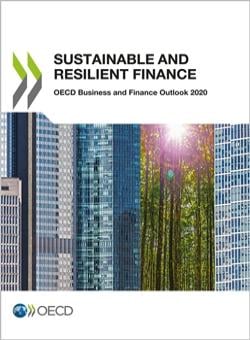Finance
Environmental social and governance (ESG) investing
|
Forms of sustainable finance have grown rapidly in recent years, as a growing number of institutional investors and funds now incorporate various Environmental, Social and Governance (ESG) investing approaches. This growth has been spurred by shifts in demand from across the finance ecosystem, driven both by the search for better long-term financial value, and a pursuit of better alignment with values. This page provides access to OECD work on monitoring developments in ESG rating and investing.
|
|
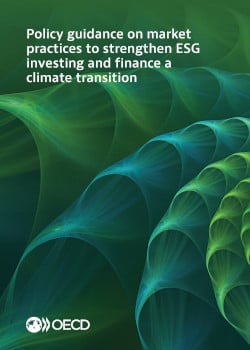 |
Policy guidance on market practices to strengthen ESG investing and finance a climate transitionWhile sustainable finance approaches are increasingly used by financial market participants, a number of challenges still undermine and hinder the efficient mobilisation of capital to support environmental, social and governance (ESG), and climate-related objectives. These challenges include limited transparency and comparability of climate transition and ESG methodologies and metrics. This document provides guidance for policy makers and market participants seeking to strengthen ESG investing and finance a climate transition through the use of quality metrics, ratings, targets and frameworks. This document was launched at the 2022 OECD Forum on Green Finance and Investment.
|
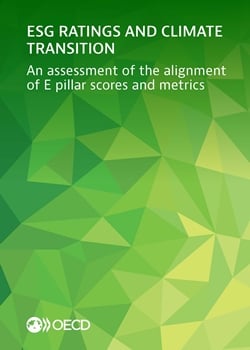 |
ESG ratings and climate transition - An assessment of the alignment of E pillar scores and metrics08 June 2022 - Environmental, social, and governance (ESG) products are increasingly being used as a tool to assess the alignment of company targets and objectives with actions to support an orderly low-carbon transition. Building on existing OECD research on ESG ratings, and particularly the environmental ‘E’ pillar, this report seeks to understand the underlying data and metrics developed by ESG rating providers and their alignment with lower carbon emissions as well as with climate frameworks and initiatives. |
 |
Strengthening ESG practices and climate transition in financial markets12/10/2021 - Amid public sector initiatives to achieve the Paris Climate Agreement, there has been growing recognition that financial markets will play a critical role in supporting an orderly transition to low-carbon economies, and a sharp growth in investors’ use of ESG and climate-aligned approaches. Despite progress, challenges remain that hinder the efficacy of such approaches. These include the promulgation of frameworks, data inconsistencies, lack of comparability of ESG criteria and rating methodologies, as well as inadequate clarity over how ESG integration affects asset allocation. This session at the 2021 OECD Forum on Green Finance and Investment explored current market practices, progress, challenges and policy considerations.
Watch the webcast |
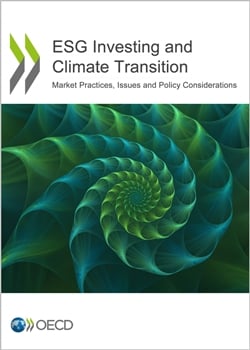 |
ESG investing and climate transition: Market practices, issues and policy considerations04/10/2021 - Environmental, social and governance (ESG) investing is gaining traction as investors increasingly seek long term value and alignment with sustainability and climate-related objectives. ESG Investing and Climate Transition highlights the main findings from recent OECD research on ESG rating and investing. It offers policy considerations to strengthen ESG practices to foster global interoperability and comparability, as well as encourage greater alignment of environmental metrics with a low-carbon transition. This serves as an input report to the G20 Sustainable Finance Working Group and contributes to a broader body of OECD work on sustainable finance and climate transition.
This report was launched at an OECD Ministerial Meeting side event on 4 October 2021 which hosted a high-level panel discussion on Strengthening ESG approaches and market alignment to foster climate transition.
Download the report |
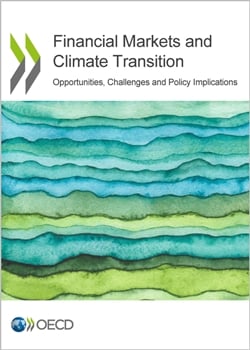 |
Financial markets and climate transition: Opportunities, challenges and policy implications04/10/2021 - The accelerating threat of climate change raises the urgency of commitment to climate transition, including the important role of global financial markets to align investment with net zero. Financial markets and climate transition focuses on the critical contribution financial markets must play towards achieving an orderly transition to low-carbon economies, and the policies needed to support this. It explores the key elements that could factor into market pricing of climate transition risks and opportunities, offers frameworks and case studies, reviews the growing range of market products and practices and puts forward policy options that can support this transition.
This report was launched at an OECD Ministerial Meeting side event on 4 October 2021 which hosted a high-level panel discussion on Strengthening ESG approaches and market alignment to foster climate transition.
Download the report |
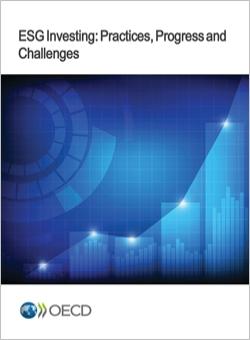 |
ESG Investing: Practices, Progress and Challenges25/09/2020 - While the mainstreaming of forms of sustainable finance is a welcome development, the terminology and practices associated with ESG investing vary considerably. One reason for this is that ESG investing has evolved from socially responsible investment philosophies into a distinct form of responsible investing. While earlier approaches used exclusionary screening and value judgments to shape their investment decisions, ESG investing has been spurred by shifts in demand from across the finance ecosystem, driven by both the search for better long-term financial value, and a pursuit of better alignment with values. This report provides an overview of concepts, assessments, and conducts quantitative analysis to shed light on both the progress and challenges with respect to the current state of ESG investing. It highlights the wide variety of metrics, methodologies, and approaches that, while valid, contribute to disparate outcomes, adding to a range of ESG investment practices that, in aggregate, arrive at an industry consensus on the performance of high-ESG portfolios, which may remain open to interpretation.
Download the report |
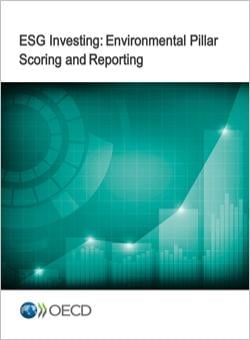 |
ESG Investing: Environmental Pillar Scoring and Reporting25/09/2020 - With growing numbers of institutional investors and funds now incorporating various ESG investing approaches, the extent to which environmental (E) pillar scoring and investing reflect the environmental impact, carbon footprint and resource use of these investments is critical to enable market participants to make informed decisions relating to a low carbon transition. This can include a strategic re-orientation towards renewables, climate-related risk management and adaptation, as well as operational processes to improve water use, waste management and impact on biodiversity. This report assesses the landscape of criteria and measurement within the E pillar of ESG investing to better understand the extent to which E scores reflect outputs such as carbon emissions and core metrics that capture the negative effects of business activities on the environment, and to understand the impact of climate change to businesses. In doing this, the report examines whether E scoring and reporting effectively serve markets and investors that are using ESG investing in part as a tool to make portfolios more resilient to physical and climate transition risks.
Download the report |
Sustainable and Resilient Finance: 2020 OECD Business and Finance Outlook29/09/2020 - The 2020 edition of the OECD Business and Finance outlook focuses on sustainable and resilient finance, in particular the environmental, social and governance (ESG) factors that are rapidly becoming a part of mainstream finance. It evaluates current ESG practices, and identifies priorities and actions to better align investments with sustainable, long-term value – especially the need for more consistent, comparable and available data on ESG performance.
Read more |
|
Related Documents
